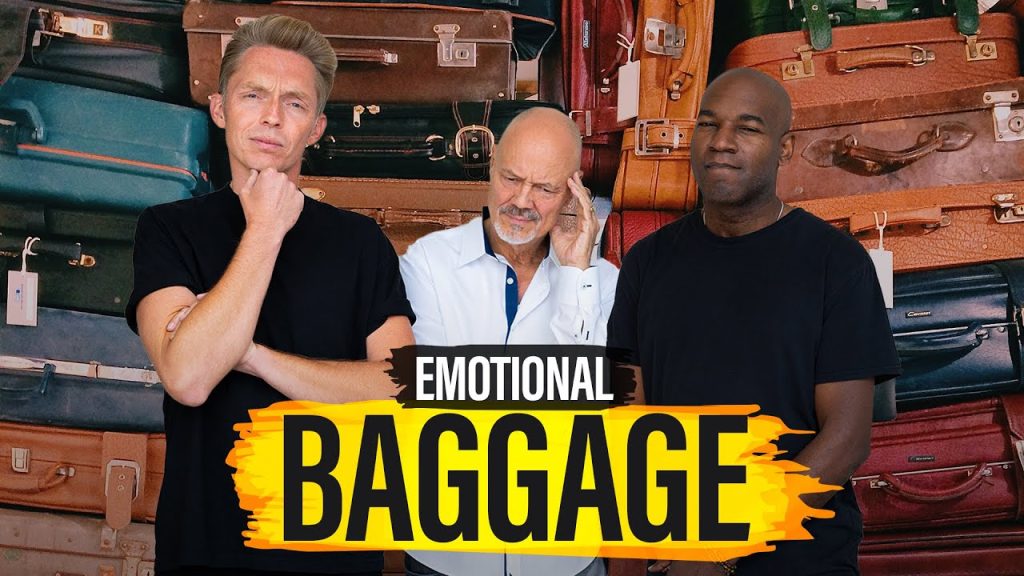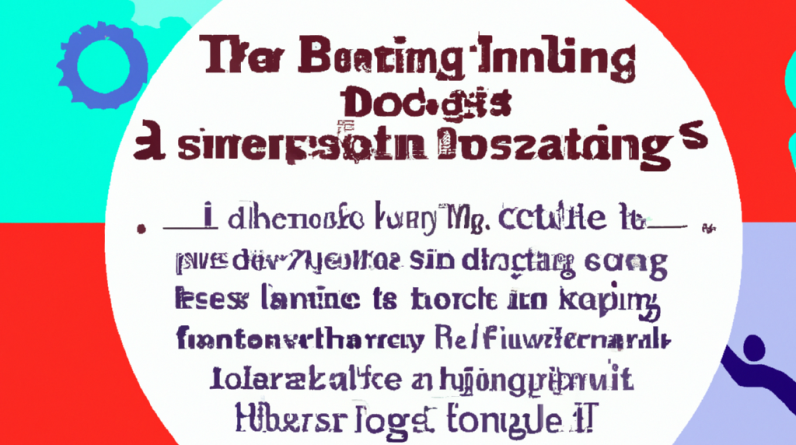
In the episode titled “Letting Go of Emotional Baggage,” The Minimalists tackle the important topic of releasing emotional clutter and its impact on minimalism. They invite Dr. Bradley Nelson, author of “The Emotion Code” and “The Body Code,” to shed light on how emotional baggage is stored in the body and can affect our physical and emotional well-being. The conversation delves into the power of forgiveness, the importance of stillness, and the societal discouragement of embracing these states of being. Listeners also contribute their own tips and questions, making for a truly enlightening discussion.
Throughout the episode, The Minimalists and Dr. Nelson share valuable insights on how to let go of emotional clutter, process grief, and find closure. They emphasize the need to disconnect the sentimental value from physical items and address the underlying emotions that are tied to them. By embracing stillness and practicing mindfulness, one can overcome the fear and discomfort associated with being still. The episode offers a wealth of advice and information for anyone seeking to release emotional baggage and create a more meaningful life.
Table of Contents
Letting Go of Emotional Baggage: A Discussion with The Minimalists
Introduction to the episode and topics covered
Welcome to this episode of The Minimalists podcast, where we delve into the topic of letting go of emotional baggage. In today’s episode, we are joined by Dr. Bradley Nelson, the author of “The Emotion Code” and “The Body Code.” Dr. Nelson will help us explore the concept of emotional baggage and its impact on our physical and emotional well-being. We will also discuss the power of forgiveness, unconditional love, and the importance of stillness in overcoming emotional clutter. Additionally, we’ll share tips and strategies for decluttering our lives and conclude with some exciting announcements.
Understanding Emotional Baggage
Explanation of emotional baggage stored in the body
Emotional baggage refers to unresolved and unprocessed emotions that become trapped in the body. As Dr. Nelson explains, emotions are vibrational frequencies, and when we experience intense emotions, the energy can become stuck or suspended within us. These trapped emotions can manifest physically and emotionally, causing discomfort and hindering our ability to move forward. Emotional baggage can range from grief and anger to resentment and frustration.
Impact of emotional baggage on physical and emotional well-being
The presence of emotional baggage can have a significant impact on our overall well-being. It can lead to physical pain, illness, and disease. Dr. Nelson notes that approximately 90% of physical pain is attributed to unresolved emotional baggage. Emotionally, these trapped emotions can keep us anchored in past traumas, affecting our ability to let go, heal, and grow.
The Body Code: Identifying and addressing imbalances
Dr. Nelson introduces the concept of the Body Code, which is a method for identifying and addressing imbalances in the body, including those related to emotional baggage. The Body Code allows individuals to pinpoint specific trapped emotions and release them, thus facilitating the healing process. By addressing these imbalances, individuals can experience a greater sense of emotional and physical well-being.

This image is property of i.ytimg.com.
Power of Forgiveness and Unconditional Love
Dr. Nelson’s perspective on forgiveness
According to Dr. Nelson, forgiveness is a crucial step in letting go of emotional baggage. By forgiving others and ourselves, we free ourselves from the burdens of resentment, anger, and grief. Forgiveness is not about condoning or forgetting the past; it is about releasing the emotional attachment we have to the pain and finding a path towards healing.
Unconditional love as a tool for releasing emotional baggage
Unconditional love plays a vital role in the process of releasing emotional baggage. Dr. Nelson emphasizes that unconditional love is not based on external conditions or expectations; it is a compassionate, accepting, and understanding love that transcends judgment. By cultivating unconditional love for ourselves and others, we create an environment of healing and transformation.
Examples of forgiveness and unconditional love in practice
The Minimalists share personal stories and examples of forgiveness and unconditional love in their own lives. They highlight the power of forgiveness in relationships and the freedom it brings. They also discuss the importance of self-forgiveness and embracing self-love as a catalyst for letting go of emotional baggage.
Processing Grief and Eliminating Emotional Clutter
Listener questions on grieving and emotional clutter
The Minimalists address listener questions about processing grief and eliminating emotional clutter. They empathize with the challenges of navigating complex relationships, such as the one with a mother. They acknowledge that the grieving process is unique for each individual and offer guidance on embracing the healing journey.
The Minimalists’ advice on processing grief
The Minimalists encourage listeners to honor their grief and allow themselves to feel the emotions associated with it. They emphasize the importance of seeking therapy or counseling to navigate the complexities of grief. They also suggest connecting with supportive communities, such as The Minimalist Fam, to find comfort and understanding.
Tips for eliminating emotional clutter
To eliminate emotional clutter, The Minimalists recommend introspection and self-reflection. They encourage listeners to identify the emotional baggage that no longer serves them and actively work towards releasing it. They suggest practices such as journaling, meditation, and seeking professional guidance to aid in the decluttering process.

This image is property of pixabay.com.
Embracing Stillness and Overcoming Discomfort
Society’s discouragement of stillness as a valid state
The Minimalists discuss society’s tendency to discourage stillness and boredom as valid states of being. They highlight the constant distractions and busyness that pervade our lives and contribute to emotional clutter. They encourage listeners to challenge societal norms and embrace the value of stillness for personal growth and self-discovery.
Importance of stillness and boredom for personal growth
The Minimalists emphasize that stillness and boredom provide an opportunity for reflection, creativity, and personal development. They discuss the benefits of disconnecting from external stimuli and reconnecting with oneself. By embracing stillness, individuals can cultivate mindfulness, introspection, and clarity.
Practicing mindfulness to overcome fear and discomfort
The Minimalists share strategies for practicing mindfulness to overcome fear and discomfort associated with stillness. They suggest starting with small moments of stillness and gradually building up tolerance. They also recommend mindfulness techniques such as deep breathing, body scans, and grounding exercises to cultivate a sense of calm and resilience.
Tips and Strategies for Decluttering
Minimalist Fam listener’s tip for decluttering
The Minimalists share a tip from a listener in the Minimalist Fam community. The listener suggests maintaining lists for minimizing, which involve listing the items they own, categorizing them, and evaluating their necessity. This practice helps create awareness and aids in the decluttering process.
Maintaining lists for minimizing
Expanding on the previous tip, The Minimalists discuss the benefits of maintaining lists for minimizing. They explain how listing possessions fosters intentionality, helps identify areas of excess, and makes the decluttering process more manageable. By regularly reviewing and updating these lists, individuals can track their progress and maintain a clutter-free lifestyle.
Managing consumer purchases and almost purchases
The Minimalists delve into the topic of managing consumer purchases and almost purchases. They discuss mindful shopping habits, avoiding impulsive buying, and setting clear purchasing criteria. They suggest asking oneself if an item aligns with their values and if it truly adds value to their lives. By adopting a more intentional approach, individuals can minimize emotional clutter associated with material possessions.

This image is property of pixabay.com.
Announcement and Conclusion
Postponement of the Sunday Symposium live event
The Minimalists announce the postponement of the Sunday Symposium live event, citing unforeseen circumstances. They assure their listeners of their commitment to future live events and encourage them to stay tuned for updates and announcements.
Promise of upcoming live events
Despite the postponement, The Minimalists promise their listeners upcoming live events in the future. They express their gratitude for the support and engagement of their community and emphasize their dedication to providing valuable content and opportunities for connection.
Concluding thoughts on letting go of emotional baggage
To conclude the episode, The Minimalists share their final thoughts on letting go of emotional baggage. They reiterate the importance of forgiveness, unconditional love, and stillness in the process of decluttering our hearts and minds. They encourage listeners to embrace the journey of emotional liberation and assure them that they are not alone in their pursuit of a more meaningful and intentional life.
As we conclude this episode, we hope that the discussion on letting go of emotional baggage has provided you with insights, strategies, and inspiration for your own journey towards emotional liberation. Remember, the path to minimalism is not just about decluttering our physical spaces; it is also about decluttering our hearts and minds. By embracing forgiveness, practicing unconditional love, and embracing stillness, you can embark on a transformative journey towards a more intentional and fulfilling life. And always remember, you are not alone – The Minimalists and their community are here to support you every step of the way.


